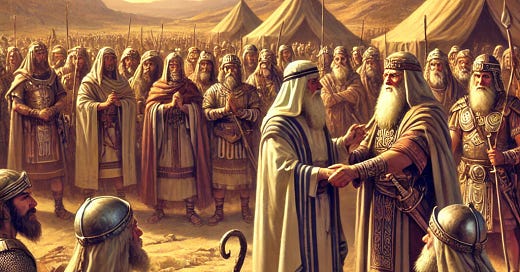Welcome to the Bible in a Year for 2025. Intro to this series and resource links available here, plus here’s how I’m approaching this year.
Scriptures for Today:
Reflection:
This is without a doubt a difficult set of readings. That said, here are some reflections—not resolutions, but reflections.
The challenge of Divinely commanded violence in the OT (Num 31) - There are several chapters or sections of the Old Testament in which violence sanctioned and even commanded by God can be jarring for us to read today. Numbers 31 is a good example of this. Since this is an endeavor to read through the Bible in a year, and not a journey to answer and resolve every question we might have about the Bible in a year, I’ll simply share the following without an expectation that this is fully satisfying for some. First, we shouldn’t be afraid to raise questions. Questions can lead to deeper faith and understanding, even though that make take a good bit of time. Second, we shouldn’t hold resolving every question as the criteria for vital faith. My faith in God doesn’t rest on the parts of the Bible that seem most difficult to me to understand, but on the central tenets of the Gospel presented in the Bible, namely, the life, suffering, death, and—crucially—resurrection of Jesus. I may not know what to make of a particular text or passage in the Bible, but if the resurrection is true, then the Gospel is true. Third, if you’re journaling and making a Legacy Bible to give to someone, you shouldn’t feel like you have to write something about every chapter or verse. Sometimes a tough question will leave you perplexed and unsure what to say. You don’t have to say anything. It’s okay to have a question and not yet have an answer or perspective on it. We’ll revisit this again in Joshua and in Samuel and Kings.
Share the sacrifice to share in the benefits (Num 32:31-32) - Two of the twelve tribes wanted land that would not put them in direct contact with opposing forces. The trouble, of course, is that this could create a kind of “free rider problem” for the burgeoning nation. So they were told and agreed to join their compatriots in crossing the Jordan River armed and prepared to fight. In this way, their land on the other side of the river from the other ten tribes would not come at the expense of sitting out of the battle.
Don’t leave any barbs to cut yourself on (Num 33:50-56) - This is a command related to the coming conquest of the Promised Land. It is very practical from a spiritual point of view. Let’s take it metaphorically for today. When I come to faith in God, it is vital to take down any other spiritual commitments or things that would trip me up and keep me from being fully devoted to God. If I don’t destroy in my heart and mind all of the “carved images and… cast idols” and “high places” of worship that were there before, then those will continue to tempt me away. A spiritual inventory is a practical and faithful necessity.
Questions:
How do you hold onto hard questions and faith convictions at the same time?
How might a spiritual inventory help you address any lingering idolatries that conflict with faith?
What else might the Holy Spirit be speaking with you about in the text today?
Prayer: Lord, today I take delight in you. I commit my way to you. I still myself and wait patiently for you. Help me to trust in you and do good in your name, for your glory’s sake. Amen.
“But the seed falling on good soil refers to someone who hears the word and understands it. This is the one who produces a crop, yielding a hundred, sixty or thirty times what was sown.” (Matthew 13:23)
If you liked this post from Seeds of Faith, why not share it and/or subscribe?
All Scripture quotations, unless otherwise indicated, are taken from the Holy Bible, New International Version®, NIV®. Copyright ©1973, 1978, 1984, 2011 by Biblica, Inc.™ Used by permission of Zondervan. All rights reserved worldwide. www.zondervan.com The “NIV” and “New International Version” are trademarks registered in the United States Patent and Trademark Office by Biblica, Inc.™



